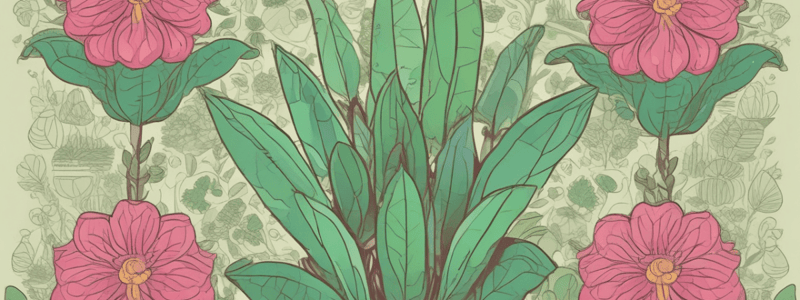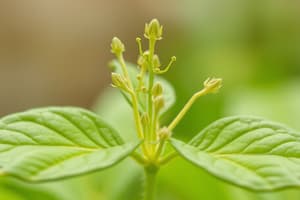Podcast
Questions and Answers
What is the primary function of plant hormones?
What is the primary function of plant hormones?
- To replicate cells in plants
- To respond to light and darkness
- To promote and regulate functions in different parts of the plant (correct)
- To protect plants from environmental changes
In which parts of the plant are hormones synthesized?
In which parts of the plant are hormones synthesized?
- In all parts of the plant, including roots, stems, and leaves (correct)
- Only in the roots
- Only in the stems
- Only in the seeds
Why are plant hormones important in horticulture and agriculture?
Why are plant hormones important in horticulture and agriculture?
- Because they help plants adapt to extreme temperatures
- Because they help plants respond to predators
- Because they allow humans to produce excess or synthesize hormones to trigger desired effects (correct)
- Because they help plants grow faster
What is a unique characteristic of plant growth compared to animal growth?
What is a unique characteristic of plant growth compared to animal growth?
What is an example of a function regulated by plant hormones?
What is an example of a function regulated by plant hormones?
What is the primary function of auxins in plant growth?
What is the primary function of auxins in plant growth?
What is the main function of cytokinins in plant growth?
What is the main function of cytokinins in plant growth?
What is the function of gibberellins in plant growth?
What is the function of gibberellins in plant growth?
Where are plant hormones typically produced?
Where are plant hormones typically produced?
What is the consequence of removing the above stem of a plant?
What is the consequence of removing the above stem of a plant?
What is the primary function of gibberellins in plants?
What is the primary function of gibberellins in plants?
What is unique about the hormone ethylene?
What is unique about the hormone ethylene?
What is the primary role of abscisic acid in plants?
What is the primary role of abscisic acid in plants?
What is salicylic acid used for by humans?
What is salicylic acid used for by humans?
What would happen to plant growth if there were no hormones to inhibit it?
What would happen to plant growth if there were no hormones to inhibit it?
Flashcards are hidden until you start studying
Study Notes
What Are Plant Hormones?
- Plant hormones are chemicals produced in many parts of the plant that promote and regulate functions in other parts of the plant.
- Hormones are chemical messengers that tell different parts of the plant to do different things, depending on the type of hormone.
- Functions regulated by plant hormones include promotion and inhibition of growth, protection from pathogens, repair from damage, ripening of fruit, and start or delay of senescence.
Where Are Hormones Synthesized in Plants?
- Hormones are synthesized in many parts of the plant, including roots, stems, and leaves.
- Hormones are then transported to the part of the plant that needs a specific hormone through vascular tissues, such as phloem and xylem.
Types of Plant Hormones
- There are five types of hormones in plants: auxins, cytokinins, gibberellins (GAs), ethylene, and abscisic acid (ABA).
- Each type of hormone has a specific function, with several secondary functions that help the plant in its life.
Plant Hormones for Growth
- Three plant hormones fall under the category of growth promotion: auxins, cytokinins, and gibberellins.
- Auxins are responsible for cell elongation in response to phototropism and gravitropism, and are produced in the stems, buds, and root tips of the plant.
- Cytokinins are responsible for cell division and are most abundant in areas of the plant that produce cells, such as seed embryo, fruit, and root and shoot tips.
- Gibberellins are responsible for stem, fruit, and seed growth, and are produced in the roots of plants.
Plant Hormones for Inhibiting Growth
- The two main hormones synthesized by plants and used for growth inhibition are ethylene and abscisic acid.
- Ethylene is responsible for aging in plants, ripening fruit, and is released as a gas.
- Abscisic acid is responsible for dormancy of different organs within the plant, and causes leaves to drop in response to environmental factors such as cold, heat, dehydration, or nutrient deficiency.
Other Uses of Plant Hormones
- Plant hormones are used for protection from pathogens, and many hormones act as the plant's immune system.
- Plant hormones are used by humans as medicine, such as salicylic acid, which is a powerful anti-inflammatory used in painkillers.
Studying That Suits You
Use AI to generate personalized quizzes and flashcards to suit your learning preferences.




